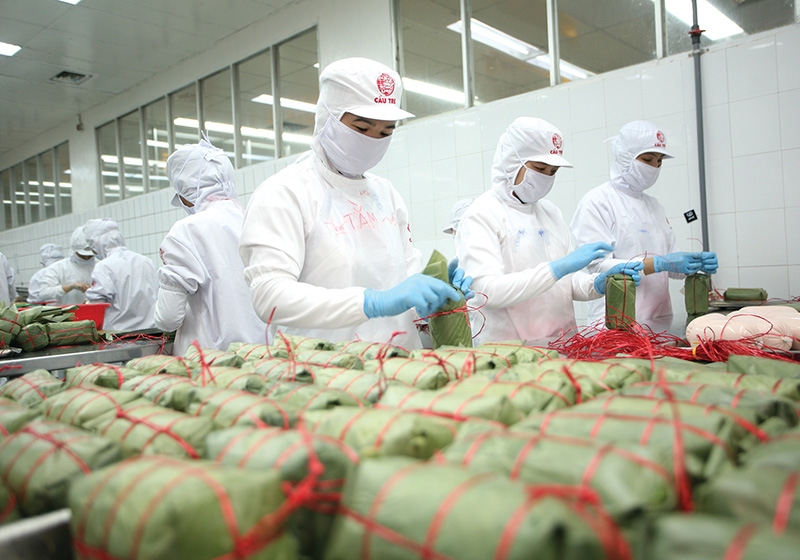Companies rush to provide for COVID-19 orders
 |
| Companies rush to provide for COVID-19 orders, Illustration photo |
Dang Quang Vu, head of marketing at An Phu Packing Production Co., Ltd in Ho Chi Minh City, told VIR that it has been inundated with orders for tents. “The customers often ordered 500, 700, or 1,000 units each, which are records since the company started operation. At peak times, the company has decreased the capacity of packing manufacturing lines, which are the company’s key product to focus on producing tents.”
In order to meet the rising demand, An Phu Packing has had to import products from China or link with other facilities that have seen fewer orders come in. “We also had to refuse some orders, which require a large volume of products in a short time,” Vu added.
He said that the selling prices were not currently stable because of a scarcity of materials and an increase in transportation fees for imported products.
“At present, rapid-fire orders have calmed down but the demand for tents is still high. The company has received orders from Ninh Thuan, Binh Thuan, and Gia Lai, as they want to prepare carefully in case the pandemic breaks out in these provinces” Vu said.
In mid-July, enterprises in 19 cities and provinces in the southern region started to conduct operations under one of two arrangements – “three on the spot” or “one road, two places” to ensure safety amid the ongoing pandemic. Such companies rushed to meet the measures placed to be able to continue operations, which meant either allowing employees to work, eat, and sleep at the facilities, or organise strict strategies for travel to and from home.
Koyu & Unitek Co., Ltd. (K&U), a joint venture between Unitek Enterprise Co., Ltd. and Japanese industrial chicken farming group Koyushokucho Co., Ltd., applied the three-on-the-spot method at its factory in the southern province of Dong Nai. K&U general director James Hieu Nhon Khuu told VIR, “The company manufactures and processes essential goods and thus we cannot work from home. When the arrangements were announced, all relevant departments focused on completing the setup for over 300 employees. We have to prepare essential products to ensure convenience and comfort for employees, for example, bunks and mattresses, blankets, pillows, and other necessities.”
Meanwhile Nguyen Thi Son Binh, chairwoman of Wanek Furniture Co., Ltd., said that three of its four facilities in the southern province of Binh Duong had to halt operations due to the pandemic restrictions. It moved to set up new measures for 6,000 employees to maintain operations and complete orders.
“The company has had to mobilise its entire resources to order tents and relevant essential goods. At the time, so many enterprises were registering to set up the new working models and so ordering became difficult because suppliers are overloaded. We have to track down these goods from various channels,” Binh said.
According to a report from Binh Duong Industrial Zones Management Authority, as of late July, approximately 1,450 of 2,000 enterprises arranged for their employees to work, eat, and sleep at their facilities. And in Dong Nai, over 1,000 businesses registered to implement three-on-the-spot, of which nearly 860 were approved. In the Mekong Delta province of Long An, approximately 930 manufacturing facilities with 49,000 employees complied with the measures.
What the stars mean:
★ Poor ★ ★ Promising ★★★ Good ★★★★ Very good ★★★★★ Exceptional
Related Contents
Latest News
More News
- VinaCapital launches Vietnam's first two strategic-beta ETFs (February 26, 2026 | 09:00)
- PM sets five key tasks to accelerate sci-tech development (February 26, 2026 | 08:00)
- PM outlines new tasks for healthcare sector (February 25, 2026 | 16:00)
- Citi report finds global trade transformed by tariffs and AI (February 25, 2026 | 10:49)
- Vietnam sets ambitious dairy growth targets (February 24, 2026 | 18:00)
- Vietnam, New Zealand seek level-up in ties (February 19, 2026 | 18:06)
- Untapped potential in relations with Indonesia (February 19, 2026 | 17:56)
- German strengths match Vietnamese aspirations (February 19, 2026 | 17:40)
- Vietnam’s pivotal year for advancing sustainability (February 19, 2026 | 08:44)
- Strengthening the core role of industry and trade (February 19, 2026 | 08:35)

 Tag:
Tag:




















 Mobile Version
Mobile Version